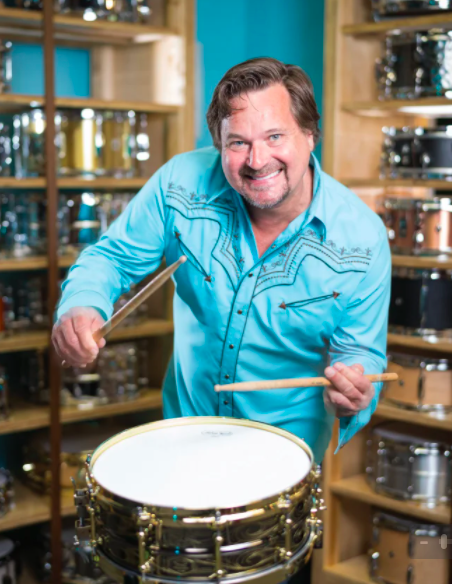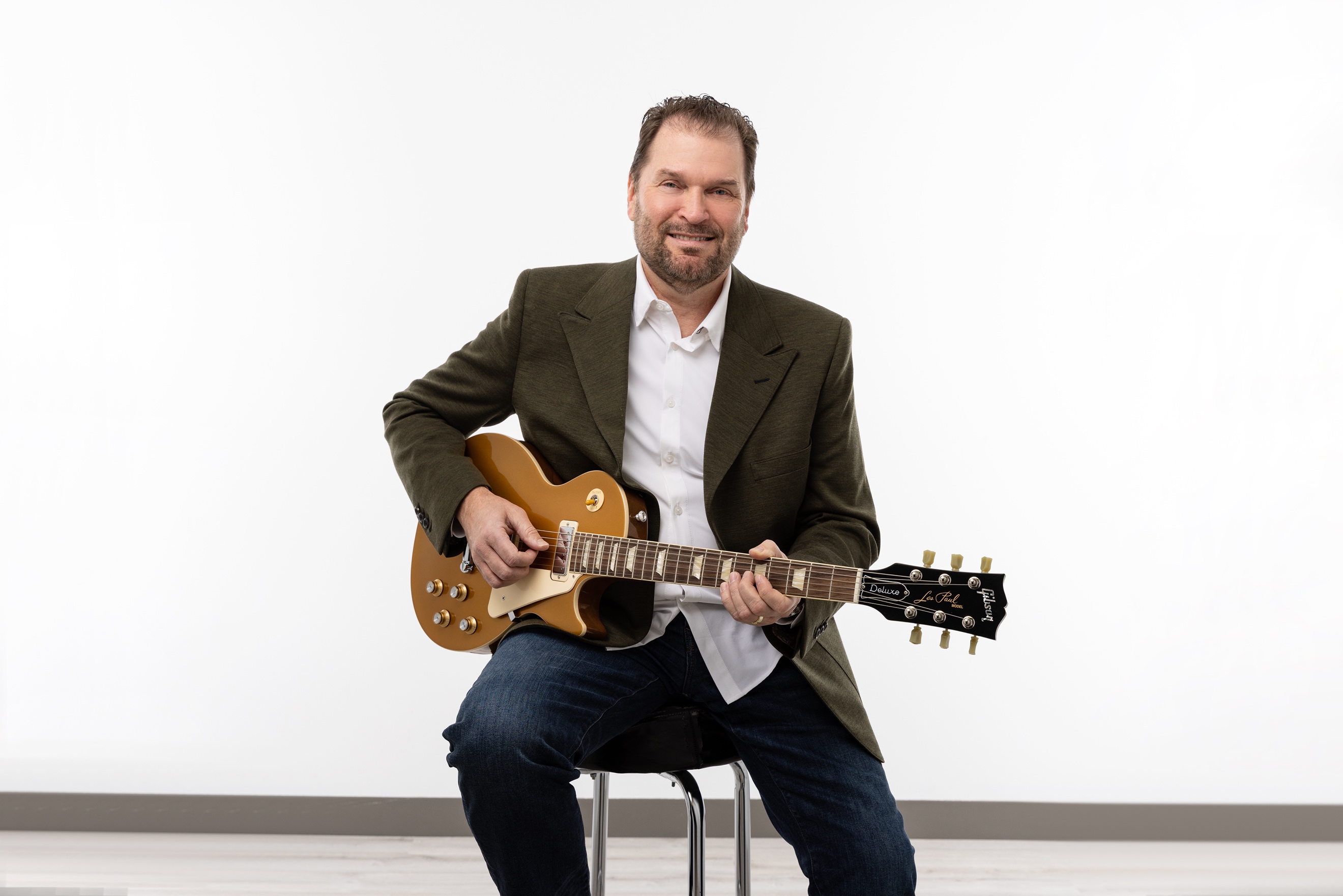
Brad Boynton
When the pandemic hit in March 2020, sales of guitars and home recording gear skyrocketed. Even the DJ market saw a boost as hobbyists started trying their hand at the turntables. And while drums are a slightly bulkier and louder hobby to set up at home, that didn’t stop retailers and suppliers from seeing a rise in demand for smaller drum sets and electronic kits.
Rhythm Traders in Portland, Oregon, was one retailer that experienced this boost.
“It was exactly what you would expect when forced indoors and away from crowds,” said Brad Boynton, who owns the one-location drum dealership. “Electronic kits, sound modules, low volume cymbals, metronomes, headphones, earplugs and practice pads have all been red hot. We also saw an uptick in mics, computer interfaces and triggers as drummers tried to connect with the world around them, even when they couldn’t leave home. I can’t tell you how many musicians I know have set up recording studios during this time, and they all needed the gear and expertise to make it happen. That was an unexpected boon for us.”
While Rhythm Traders wasn’t required to close by Oregon law, the store switched over to an appointment-only system for most of 2020.
“We literally had a doorbell on the front door,” Boynton said. “Customers could schedule a virtual or in-person appointment through our website or by phone.”
Appointments consisted of whatever the customer preferred.
“Sometimes it was a Zoom meeting, but other times we did curbside pickup, or even just a phone call,” he said. “It was important that we made the customer feel safe. For some, that meant a contactless transaction. And for those that did come through the door, we limited the number to three parties at a time and offered sanitizer and masks as needed.”
With foot traffic down 50% at one point, Boynton and his floor team had more time to up their social media game.
“We did more with Facebook Live, Facebook Marketplace and Instagram Stories,” he said. “We realized the algorithms Facebook uses favor live videos over stagnant uploaded videos and served them up to more people. So, we did more live unboxing videos, chats with suppliers and loyal customers, as well as raffles and giveaways.”
These efforts all drove sales of hot pandemic gear such as electronic drums and home recording equipment. Boynton said he believes these products will continue to be strong sellers post-pandemic.
“The way we communicate has changed, along with the way musicians interact with their audience,” Boynton said. “Whether they’re uploading tracks, teaching online or performing virtually, musicians now have to rely on electronic hardware to connect them to the rest of the world. That isn’t going to change, and any product that serves this function will be integral as far as I can see.”
Alex Simpson, owner of Rupps Drums in Denver, also saw sales of electronic drum kits soar.
“Many drummers found themselves in need of an effective, low-volume solution for home practice,” Simpson said. “Luckily, we stocked heavily on electronic products at the beginning of the year, and our electronic drums sales more than doubled compared to the same period in 2019.”
And that wasn’t the only increase Simpson saw during the pandemic. By the end of 2020, Simpson said traffic to his store’s website had increased by 143%. As a result, he dedicated a significant amount of energy to improving the customer experience and visibility of the Rupps Drums’ website.
“My long-term goal of improving the website took on a new sense of urgency,” he explained.
Fellow Portland-based retailer Revival Drum Shop wasn’t required to shutter by local law, but offered free shipping on all purchases, something store manager Jake Endicott said went a long way for customers in the area who were unable to stop by in person.
“Also, for the first three months of the pandemic, we focused on selling through our existing stock versus placing large orders,” he explained. “During that time, we definitely relied heavily on product demo videos posted on our social media to generate sales.”
Suppliers Chime In
It wasn’t just retailers seeing a boost in electronic kit sales. Yamaha reported seeing strong sales of its electronic kits, including the DTX402 Series. Matt Rudin, Yamaha marketing manager for drums, said even the recently launched DTX6 Series has been selling very well this year.
“We expect the success of these products to continue post-pandemic, since the benefits of these products will not change,” Rudin said. “In many ways, the past year was catalyst for change that was already underway prior to the pandemic.
“Music has been an incredible outlet for expression, provided comfort and given many the opportunity to learn something new this past year. This has brought increased awareness, which will help build market share for these products down the road.”
Electronic kits aside, Dixon Drums reported increases in sales of its Jet Set Plus and Little Roomer compact drum sets.
“These are great kits that can easily be converted for any setting,” said Jim Uding, product and sales manager of Dixon Drums. “They are really a family drum set, where you can put them in the recreation room and anyone can play.”
One product in the drum market not often associated with home confinement, cymbals, also experienced its own trend during the pandemic. Andy Morris, owner of Dream Cymbals, said the lockdown drove sales of cymbals that “would not annoy non-drummers.”
“We saw sales of thinner, more musical cymbals, if you will, do very well,” he explained, adding that large cymbals like the company’s new 24-inch selection are now selling strong, as well as large hi-hats.
A Period of Realization As restrictions have begun to lift, Rhythm Traders’ Boynton reflected on the last 18 months, saying that he believes this time has pointed out weaknesses in the drum market and highlighted areas needing work.
“For suppliers, it was everything from overseas factory closures and shipping bottlenecks to computer viruses and cyber attacks,” he explained. “Back orders are still commonly six to nine months out, and some companies are still not accepting special orders. For me, that means sourcing something as simple as hardware packs can mean hours of research and half a dozen purchase orders as I wait for whoever can deliver. I imagine every supplier is looking at their manufacturing, shipping, inventory levels, pricing and cash flow to find the problems and fix them.”
For drum retailers, he said, the last year and a half has pointed out where inefficiency has given them the opportunity to be better than before.
“It’s a humbling but necessary process,” he said. “When sales slow, you have to cut overhead. We were forced to go from a seven-day workweek to five, and we looked at all of our fixed costs from credit card processing to phone bills and various subscriptions to trim the fat. We’re more efficient than ever and ready to grow again.”
Dixon Drums’ Uding agreed that the pandemic has shown the drum industry the importance of being nimble.
“The drum business has been on a straight and narrow path for the past 10-plus years,” Uding said. “It’s been healthy, but hasn’t been able to turn left or right. I think it’s up to the industry now to start thinking outside the box. [While working] in retail, I used to point out to parents that drumming is a little different than most categories. I think it’s time for the acoustic drum business to identify more with the future than the past. Don’t make drumming appear to be so simplistic that you keep drummers from the complete experience, which is going below the surface.”
The Future of the Drum Industry
Andy Morris of Dream Cymbals said he believes the future is bright as he has recently seen many customers gravitating towards quality drum products.
“I think the lockdowns forced people, in many ways, to consider what’s important and spending so much time online gave folks a perspective about how they make music and why and what is meaningful to them,” Morris said. “For that reason, quality instruments that have personality and character have gained in value in that people want to have a relationship to music and music making that’s reflected in the instrument they use. It’s tactile, personal and, in a way, intimate. For that reason, great custom drums and hand-hammered musical cymbals will be seeing a comeback continue on the backs of this relationship. Stuff that exists only to meet a low price point will plateau or decline.”
Yamaha’s Rudin said the company is already seeing signs of elevated demand for acoustic instruments and hardware.
“Sales of instruments that make life on the road and live gigs easier have been going up,” he explained. “This has been seen in products such as our HW-3 Lightweight Hardware and our Stage Custom Hip kits, which allow drummers to load-in and load-out of venues with ease.”
Echoing Morris’ sentiment, Rudin said Yamaha also expects to see an increase in sales of higher-end and intermediate drum sets with the new drummers eventually looking to upgrade their sound with a new kit.
“Just as the Renaissance occurred after one of the most challenging times in Europe’s history, I believe that we’re entering a similar feeling that will lead to a period of increased artistic expression and appreciation,” Rudin said. “In turn, this will generate more activity with musicians and the need [for the] tools to create, perform and share their music.”
When asked about the future of the industry, Boynton put it the most directly, “We’re gonna make it!”
“The resilience of our industry puts a smile on my face. More than ever, customers want to shop local and want an ally during uncertain times,” he continued. “This past April, we were able to ditch the doorbell for good and open our doors to regular traffic. Our 2021 sales are already up over pre-pandemic levels, and foot traffic is back to normal. What has changed is the customer is more intentional in the way they shop, and a higher percentage walk out the door with a purchase.” MI













